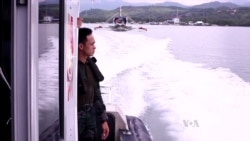As Beijing’s military forces consolidate positions in the adjacent South China Sea, officials here say they are finding Chinese poachers in what is clearly their territorial waters.
“I have seen them as close as 15 kilometers off the coast,” said the Philippine National Police Maritime Group’s Captain Philip Suarez. “They are catching sharks, stingrays and endangered turtles.”
Suarez pilots one of six vessels that make up the Special Boat Unit. The 10-meter-long ships were given to the Philippines by the United States in 2010 and can cut through the sea at up to 40 nautical miles (21 kilometers) per hour.
“Sometimes when they saw us from afar, they try to escape,” he said. “But our boat is faster than their boat.”
Arrests of Chinese Fishermen
In 2014, Suarez and his crew responded to reports of foreign fishermen off the province’s southern shore. They apprehended 11 Chinese nationals who were carrying hundreds of a protected tortoise species.
The poachers later were convicted in a Puerto Princesa court and jailed after they were unable to pay fines for illegally fishing. They were released this past June after a year in confinement.
Philippine Reaction to Chinese Expansion
Sino-Philippine relations are already tense due to the territorial disputes in the South China Sea. Manila says Chinese forces are occupying rocks and reefs in its exclusive economic zone, while Beijing, which has built structures on top of several of these features in the region, maintains the area is part of its historical fishing waters.
The poaching and prosecutions only further strain bilateral ties.
China is “a threat to our internal security,” according to maritime police inspector John Labunog Aller, who says Beijing has taken over a part of Palawan.
Philippines: Chinese military units protecting fishermen
To avoid arrest by the Philippine police, Chinese fishermen and their country’s coast guard seem to sail side by side, say some local officials.
Mayor Eugenio Bito-onon Jr. recalls in 2012 observing what he describes as a “Chinese warship” accompanying around 100 small fishing boats that were anchored at a coral reef that lies within his Kalayaan municipality in the South China Sea.
“The whole reef was smoking,” he said, due to diesel machines the poachers used to destroy the coral.
Manila says China has built military outposts on its new artificial islands, including an airplane landing strip. President Benigno Aquino has likened Beijing’s maritime advancement to the rise of Nazi Germany.
The Philippines also has a military presence in the region, but on the whole, the Chinese maritime forces are larger and more modern. One of the Philippines’ last lines of defense is the Sierra Madre -- a rusting, World War II-era cargo vessel that’s beached on an atoll and is home to a handful of Philippine soldiers.
Philippines Defiant, But Needs Help
The government has appealed to the United States to develop a small base on Palawan’s west coast that could be used by the American Navy to station ships. But the Supreme Court is currently deciding if a base-sharing agreement signed last year by presidents Aquino and Obama violates the country’s constitution.
Palawan’s Special Boat Unit hasn’t had any run-ins with the Chinese coast guard, so far. The province’s two-boat fleet is based in Honda Bay on the east coast, and it could take days to reach illegal fishermen and their military protectors in the South China Sea.
Some of the unit’s officers say a possible confrontation won’t deter them from policing Palawan’s waters.
“We are bound to implement the law,” said police sub inspector Raymund Abella. “No one could stop us.”













